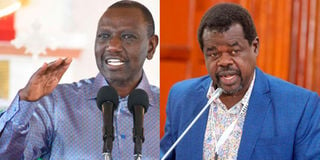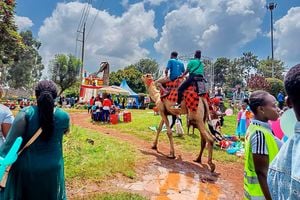
President William Ruto (left) and Busia Senator Okiya Omtatah.
Busia Senator and long-time rights activist Okiya Omtatah officially dipped his toes into Kenyan presidential waters last week. He launched a 10-member committee to assess the viability of his run in 2027.
Omtatah’s jump into the fray is unusual in that, as he said: “This is a world of data...it is only when we have actionable information backed by data that one can make an informed decision. That is the preliminary stage of my presidential ambitions.”
Perhaps not entirely surprising coming from a philosopher; otherwise, in our end of the woods, people who run for president (or member of Parliament) usually do so because they heard the voice of God urging them to go forth and lead the flock, or had several delegations that begged them to offer their great talents in their service.
However, Omtatah also veered into the familiar, saying he believed he had something to “offer in helping our country achieve the elusive dream of people-centred governance”. There it was; “people-centred” is from the same “hustlers” and “bottom-up economics” playbook that President William Ruto drew from with deadly effect in his 2022 campaign.
Old establishment parties
Because he privileged the hustlers, the masses, over the elite and “dynasties”, Ruto’s campaign was presented as populist, like others around the world that were bundling old establishment parties and leaders on both the left and right out of power (e.g., Giorgia Meloni winning power as Italian Prime Minister in October 2022; libertarian Javier Gerardo Milei clinching the Argentinian presidency in August 2023; and most recently and dramatically, in Donald Trump’s election triumph in the United States).
If Omtatah does make good on his intention, we could have two populists facing off, with President Ruto releasing a 2.0 version of his hustlers’ programme. If leaders like Kalonzo Musyoka enter the race, he too can be expected to tilt in a populist direction, because clearly, that is how to win an election in present-day Kenya.
That said, there is a lot of generalisation there. African populism is quite different from the variety that is sweeping parts of Europe, North and Latin America, and Asia. In most of those places, particularly on the right, it is nativist and nationalist—as in Trump’s “America First”—anti-women, anti-democratic/illiberal, among others. In both Europe and North America, it is anti-internationalist/Eurosceptic, anti-immigrant, anti-Muslim, and racist.
By contrast, until the May election in South Africa, when former president Jacob Zuma’s MK Party came along, Africa’s most populist party was Julius Malema’s Economic Freedom Fighters (EFF) in the same country. It is very anti-big capital and pro-labour. However, while MK Party seemed to give a nod to South Africa’s anti-African immigrant xenophobia, EFF is staunchly pan-Africanist, and Malema has even talked about abolishing colonial borders on the continent. The EFF didn’t win; it posted its worst electoral performance, and is fast disintegrating.
In Senegal, the ruling African Patriots of Senegal for Work, Ethics and Fraternity (PASTEF) party of youthful President Bassirou Diomaye Faye rode to power in April on the wave of a populist agenda focusing on anti-corruption, economic reform, addressing youth unemployment, and anti-imperialism (directed at former coloniser France). While it was projected as populist, it was more accurately radical. Like Malema’s EFF, it has a strong pan-Africanist bent. It is democratic, and ultimately in office, it has turned out to be more pragmatic-centrist than anything else.
The one true exception has to be Tanzania’s former president John Magufuli, who died on March 17, 2021. He was full of contradictions. Despite graduating as a scientist, Magufuli was probably the least scientific Tanzanian president. A vaccine sceptic, he refused to take Covid-19 seriously, viewing it as little more than the severe flu that could be sorted out with strong brewed African herbs and the inhalation of eucalyptus-infused steam in a cubicle.
Gender equality
Magufuli’s views and policies on women’s rights were often seen as regressive by those advocating gender equality. He banned pregnant girls from attending school. He scoffed at women painting their nails. Harking back to traditional family values, he encouraged women to “set your ovaries free” and have more children. He claimed birth control was for “lazy” people.
A rough diamond and isolationist, the authoritarian Magufuli was also a nation builder and, in his early seasons, an effective anti-corruption warrior before allegedly falling to its temptations during his last lap in office. That he was the outlier points not just to how different African populism is from its Western cousins, but to the fact that it might be more enlightened.
We wait to see how the 2027 presidential contest in Kenya will pan out, but should Omtatah emerge as a national leader of note (if not president), and President Faye doesn’t take the well-trodden road of reformist-turned-corrupt-autocrat, the African brand of populism could have many years in the sun, long after its American and European counterparts have crashed and burned out.
The writer is a journalist, writer, and curator of the "Wall of Great Africans." @cobbo3.










